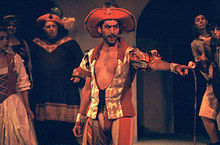Petruccio
| Petruchio | |
|---|---|
| The Taming of the Shrew character | |

Petruchio (Kevin Black) in his wedding outfit, in a Carmel Shakespeare Festival production at the outdoor Forest Theater in Carmel, CA, Oct. 2003
|
|
| Created by | William Shakespeare |
| Portrayed by |
Arthur V. Johnson (silent, 1908) Douglas Fairbanks ("talkie", 1929) Alfred Lunt (stage, 1935) Stanley Baker (TV, 1952) Peter O'Toole (stage, 1960) Richard Burton (film, 1967) John Cleese (tv, 1980) Timothy Dalton (stage, 1986) Morgan Freeman (stage, 1990) Neri Marcorè (Italian film, 2004) Rufus Sewell (TV, 2005) David Caves (stage, 2012) |
| Date(s) | c.1590–1594 |
| Source | 14th-century Castilian tale |
| Information | |
| Role | Male romantic lead Kate's wooer and later her husband |
| Quote | "Why, there's a wench! Come on, and kiss me, Kate." |
Petruchio (an anglicisation of the Italian name Petruccio; Italian pronunciation: [peˈtruttʃo]) is the male protagonist in Shakespeare's The Taming of the Shrew (c. 1590–1594). Petruchio is a fortune seeker who enters into a marriage with a strong-willed young woman named Kate and then proceeds to "tame" her temperamental spirit. The role has attracted notable performers.
In the play, Petruchio comes to the town of Padua in the hopes of marrying a wealthy woman. Hortensio suggests that he marry Kate Minola, the daughter of one of the wealthiest men in the city, particularly because Hortensio can not court her sister Bianca until Kate is married. Petruchio takes an interest in Kate, owing to the dowry he could potentially receive, and agrees. During his first encounter with Kate, he matches her fierce temper and manages to convince her father that she passionately loves him but only pretends to hate him in public. The two are married, with Petruchio arriving at the wedding late and forcing Kate to leave the ceremony feast early.
Petruchio then starts to try to "tame" his wife in a variety of ways. He frightens Kate by yelling at the servants, and he prevents her from eating by insisting that the dishes are not good enough for her. He then offers Kate dresses and jewellery, only to return them saying that they too weren't good enough. When Bianca and Lucentio are married, Petruchio refuses to let Kate go to the wedding unless she agrees with everything he says, regardless of the validity of his claims. He puts her to the test by telling her that a man is a woman and that the moon is the sun – she agrees with both statements.
At the wedding, Petruchio is taunted by Hortensio and Lucentio for having married a "shrew". Petruchio proposes a contest to see which man has the most obedient wife: The three men are to call for their wives to see which ones respond. Of the three women, only Kate comes, and a triumphant Petruchio is the winner. Petruchio then orders Kate to bring the other wives and give a speech telling them to honour their husbands always.
Petruchio is debatably the most complex character in The Taming of the Shrew. His motives can be interpreted in several different lights, with each interpretation entirely changing the tone of the play. One popular opinion is that Petruchio is, for the most part, a selfish misogynist determined to tame Katherine for his own convenience and pride. He simply wanted to tame her to be able to say he tamed the most shrewish woman. He only wanted to have the relationship to uphold or improve his own reputation in the town. In this interpretation, Petruchio marries Katherine solely for her dowry. The counterargument is that Petruchio develops love for Katherine and tames her because he sees her shrewishness as a condition that she cannot cure on her own. Another interpretation is that Petruchio likes Katherine for her strong, challenging personality and takes on taming her as a fun challenge. Regardless, Petruchio seems to believe, like most men did at the time, that society is most stable if women are submissive to their husbands. There is also some debate about how seriously we should take Petruchio, and hence how we should interpret the meaning of the play. His ridiculous actions, including his unconventional attire at his wedding and his treatment of Katherine once they are married, are sometimes viewed as a reflection of his descent into madness. On the other hand, some see Petruchio as the fool of the play and attribute his actions to intended comic relief. Petruchio's character is very powerful in that the light in which we view him can change the play from a dark story of male chauvinism to an absurdist comedy.
...
Wikipedia
